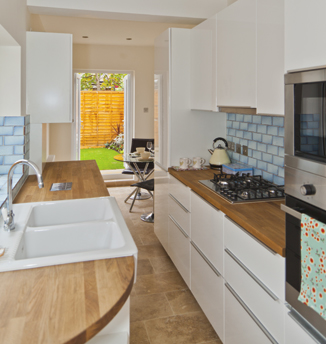It is two years since we first highlighted Thor Portess who explained in an extensive and enlightening interview back then just how he was using some Option and Delayed Completion Contracts to enhance his investment returns.
Some of the deals were around London, which we highlighted in the magazine, and as Thor explained a few weeks ago to me, they have now resulted in quite substantial returns on the cash invested, with substantial equity gains being achieved by him and some of his joint venture partners. One of the deals in north London which was structured using a Delayed Completion contract has seen a gain in market value well in excess of £200,000. In addition the unit has also delivered very strong monthly cash-flow in the intervening period.
I caught up with Thor recently at one of his current projects, where a four month major refurbishment has been successfully concluded, to hear in detail about the deal and to hear how he has progressed with his property investing activities.
"When I first started doing creative structured deals", said Thor, "the market segment I was in wasn't very liquid and there wasn't a lot of equity in many of the properties that I was looking at from motivated vendors, some of whom have been caught out by the 'credit crunch' in 2008.
"I primarily provided an exit by helping vendors to sell using Options and Delayed Completion Contracts and sometimes offered a modest BMV and then added value through refurbishment and or financial assistance to buy when it was time to get the property sold."
 The period he refers to was from 2008 through to around mid-2013 when, as we now know, market confidence returned and property values particularly around London really took off. Property traders and deal sourcers had to quickly adjust their sights as competition increased and trading margins (alongside risk) quickly changed.
The period he refers to was from 2008 through to around mid-2013 when, as we now know, market confidence returned and property values particularly around London really took off. Property traders and deal sourcers had to quickly adjust their sights as competition increased and trading margins (alongside risk) quickly changed.
"The market has certainly changed in the last few years, especially around London where my business is primarily now based. I have set up my new company Hamilton Paige, with the aim to add value to sellers in three distinct areas: Planning, Refurbishment and Finance.
"Most sellers that I come across don't have or cannot access finance and/or have the inclination to act on the assets they have and in some cases they don't know what they have because they don't think as a property investor. That really has not changed from when I started out implementing these strategies around six years ago to add value through either Refurbishment or Planning Gain. Typically these are the two areas we are adding value in combination with providing the finance to do it with.
"At the moment, I am doing some creative refurbishment/development deals where one can add value so that the seller actually makes more money than if they had sold outright and we do this via a Joint Venture type of deal. This saves a lot of costs for us, so it increases the profit for the seller and also for us."
I asked Thor to explain how 'costs' are saved in more detail.
"The primary cost savings are from finance costs on purchase and then not having exit sale fees and all the legal costs. As such we have less of our physical cash being tied up in a deal for a lengthy period and having 50-60% of our funds being available to put into other deals."
Experienced readers will be well aware that with more complex property transactions, you really need very competent professionals working with you who understand the structures and can work to tight deadlines. Too many investors seem to try and do things 'on the cheap' and can often end up paying a hefty price as deals fall through or mistakes are made which can cost an investor 'big time', or they end up in a protracted legal dispute with a vendor or other parties.
Thor explained how they work with their lawyers: "The contracts we use with vendors are put together by some highly experienced commercial lawyers who have proven themselves over time with me on a number of deals. They know what we need and can act fast."
We met at a property in Tottenham, north London. The property's recent history as well as its owner's story is quite revealing as Thor explains in detail.
"The house in Rosebery Avenue needed a serious amount of work to refurbish it to a good specification. The seller had some 'emotional baggage' with the property and she had left it empty for eight years while renting elsewhere with a partner somewhere else.
 "She had previously tried renting it to a close relative, who then attempted to grow marijuana in the property. The police stopped the operation but it left the seller with an empty, very messy property and a backyard filled half way up the fence with rubbish and a £2,000 electric bill as the meter had been bridged. Thankfully there was no structural damage but it really was in quite a poor state.
"She had previously tried renting it to a close relative, who then attempted to grow marijuana in the property. The police stopped the operation but it left the seller with an empty, very messy property and a backyard filled half way up the fence with rubbish and a £2,000 electric bill as the meter had been bridged. Thankfully there was no structural damage but it really was in quite a poor state.
"We undertook to do a full refurbishment project which required new gas central heating to be installed as well as new electrics throughout. We moved the bathroom into a small extension upstairs, reconfiguring the rooms, removing chimney breasts and raising the height of the rear ground floor walls. This meant that the height of the ceiling could allow for the kitchen to spill out into the extension.
"We had to install two steel beams into the extension to get rid of the old external wall/doorway and to widen the existing access to the kitchen. We installed two double glazed doors at the rear of the house with a side return to incorporate new external decking with landscaping and to bring the garden 'into the house' so to speak.
"We also turned the loft space into a useable storage room with roof lights which creates extra usable space in the house, as it's only a small 2-bed property with just 820 sq ft of saleable floor space (excluding the loft space)."
The obvious question: how was the deal financing structured with the vendor?
"We gave the seller £10,000 upfront," said Thor. "We then spent a further £70,000 on the refurbishment and agreed a deal with the seller whereby the seller received a
total of £200,000 unconditionally within 12 months (including the £10,000 upfront) and we take anything above this amount.
"We now have it under offer for £385,000, so after £4,000 in legal costs and other professional fees to enter the deal and a further circa £5,000 in sale costs (estate agent and legal), there is around £106,000 profit."
How long has this taken? "The contracts were exchanged in mid-August, so we expect the deal to take five months in total which is exceptionally fast for the amount of work done to the property and to complete the sale."
Clearly a fascinating scenario so I asked how the deal was sourced and what was the 'back story' on the property and also what were the vendors' circumstances which led to the 'deal' being available.
"The property was sourced by one of my partners, Raj, who knew the seller and their situation but he did not have the experience to close this type of deal and see it through to fruition.
"It might sound easy to some people with good experience as a landlord, but the art of doing these more creatively structured types of deals is to gently find out the sellers motivations and then to carefully and precisely build up a proposal over on average seven points of contact.
"When I used to do training workshops to show property investors how to negotiate a deal with vendors, we would break the process down into three stages; Opening, Leading and then Closing.
"Unfortunately and perhaps understandably, most people go straight for the Close, and for me this is not the way to do it, particularly with more sensitive vendors. You really need to find out the 'why's', and then sell the benefits of a certain type of deal before you look to close it."
So how was the deal financed? Thor explains: "On this deal, Raj and I funded the deal equally with our own funds and we split the profit 50/50. Sometimes, I will pay an introducer 2% of the land value or 10% of the net profits (whichever is the highest) or if they have other expertise, skills and/or finance to bring to the table, I am open to doing a joint venture with like-minded and willing investors/partners."
How was the deal struck and what were the vendor's choices as to why she chose that particular offer from you?
 "Without complicating it; one of the ways to close this deal was to offer the vendor three proposals (together with the Open, Lead, Close negotiation format).
"Without complicating it; one of the ways to close this deal was to offer the vendor three proposals (together with the Open, Lead, Close negotiation format).
"Option 1 was an outright sale at £180,000 with it all being done and dusted in four weeks. This would be a typical offer made by anyone on this type of distressed condition property with a buyer wanting a quick, easy solution.
"Option 2 was as above but with £200,000 unconditionally on offer and a sale to be concluded within 12 month time period.
"Option 3 was £180,000 unconditionally, again within 12 months plus 50% of the net profit after development costs."
So what happened? "The Seller opted for Option 2 as it was more cash, but with more certainty for them."
Many readers may well be thinking at this point that paying a £10,000 upfront payment to a vendor and then spending £70,000 on a refurbishment as well as being liable for legal costs etc. might be a somewhat questionable strategy, involving a degree of risk to which Thor responded when I raised this point: "Working with commercial property lawyers who are very experienced is obvious crucial, alongside having very robust legal contracts. We used to use 'rescindable' contracts which can deter some people but we now use ones which are seen as being 'more friendly' and not as daunting by vendors. Obviously, we have to ensure this is as watertight a process as possible, so the vendor has to have their own legal representation to protect their interests.
"The biggest risk is not having a full title 'guarantee' so you have to be confident in the owner, the deal and the contract.
"Another deal we did this year was where the seller opted for having an outright cash sale, but where we went and got planning approval for a second house to be built in the rear garden. So the moral of the story is that we don't just have one strategy, but give the seller some flexibility and choice(s) to decide what is best for them. If we buy the property outright, then we sometimes will work with private investors who like a fixed return on their funds."
Thor gives a basic cost




















